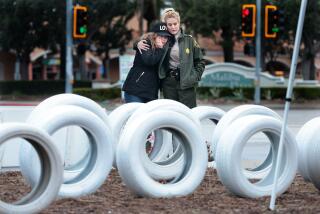Toll-Road Bill Hailed as Merely Constructive
SACRAMENTO — While welcoming legislative approval of the concept of toll roads, Orange County officials were doubtful Thursday about whether a toll-road bill passed by the Assembly would help the county’s chances of building California’s first public turnpike.
The bill by Assemblyman Nolan Frizzelle (R-Huntington Beach) that passed Thursday authorizes counties to build toll roads and operate them or allow private corporations to do so.
“We like the idea that the Assembly likes the idea of toll roads,” said Stan Oftelie, executive director of the Orange County Transportation Commission. “In a time when there is such a shortage of funds to build new roadways, toll financing may make good sense in very narrow, selected areas.”
The areas being considered are the Foothill Corridor, between Orange and San Juan Capistrano; the Eastern Corridor, between Irvine and the Riverside Freeway, and the San Joaquin Hills Corridor, through the coastal foothills between Newport Beach and San Juan Capistrano. Also being considered, though not as seriously, is an extension of the Orange Freeway along the Santa Ana River.
Two of those routes--the San Joaquin Hills Corridor and the Orange Freeway extension--are already in state transportation plans and thus could not be financed by tolls under a provision in Frizzelle’s bill, Oftelie said.
In addition, Frizzelle’s bill would not allow the county to delegate to another governmental agency the responsibility for selling the bonds to finance building the roads. The county has already formed two agencies sharing powers with several Orange County cities to plan, finance and build the highways.
Oftelie said the commission hopes Frizzelle will amend his bill to bring it into line with a measure by Sen. John Seymour (R-Anaheim) that authorizes such joint authorities to finance and build toll roads and does not include some of the other restrictions in Frizzelle’s bill.
John Meyer, executive director of the two transportation corridor agencies, said the restrictions in Frizzelle’s bill were “worrisome.” But he said Assembly passage of the legislation was a step in the right direction.
“In concept, we have a lot to work with here,” Meyer said. “I’d like to see the bills be compatible, and we’ll move along with both of them.”
But Frizzelle, who wrote a similar bill that was defeated last year after the county and the transportation commission opposed it, said he does not intend to modify his measure much as it moves to the Senate for consideration. He said he had already accepted an amendment to another bill he is carrying that would allow the joint-powers authorities to operate the Orange County roads after they are built.
Frizzelle said he purposely crafted the bill approved Thursday to exclude the San Joaquin Hills Corridor because he doesn’t think that route makes sense as a toll road. Frizzelle said the route, an extension of the Corona del Mar Freeway from Newport Beach to San Juan Capistrano, would do little to relieve congestion caused by motorists traveling through Orange County.
“I feel the San Joaquin Corridor does not solve the problem the county needs solved,” Frizzelle said. “We have to have a corridor that goes all the way through the county. We have to have some secondary route people can use to transit through the county to the south.”
Although Frizzelle said he would work with the county and the transportation corridor agencies, he said his legislation would provide options that the county could accept or reject as it chose.
“There’s no reason for the county to oppose it,” he said. “They simply don’t have to use it if they don’t want to.”
More to Read
Sign up for Essential California
The most important California stories and recommendations in your inbox every morning.
You may occasionally receive promotional content from the Los Angeles Times.










